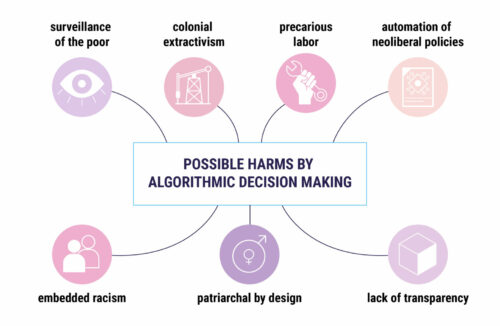The Oracle for Transfeminist Technologies

this oracle is a hands-on card deck designed to help us collectively envision and share ideas for transfeminist technologies from the future.


this oracle is a hands-on card deck designed to help us collectively envision and share ideas for transfeminist technologies from the future.

Feministai.net is an ongoing effort, work in progress debate that seeks to contribute to the development of a feminist framework to question algorithmic decisions making systems that are being deployed by the public sector. Our ultimate goal is to develop arguments and build bridges for advocacy with different human rights groups, from women’s rights defenders to LGBTIQ + groups, especially in Latin America to address the trend in which governments are adopting A.I. systems to deploy social policies, not only without considering human rights implications but also in disregard of oppressive power relations that might be amplified through a false sense of neutrality brought by automation. Automation of the status quo, pertained by inequalities and discrimination.
The current debate of A.I. principles and frameworks is mostly focused on “how to fix it?”, instead of to “why we actually need it?” and “for whose benefit”. Therefore, the first tool of our toolkit to question A.I. systems is the scheme of Oppressive A.I. that we drafted based on both, empirical analysis of cases from Latin America and bibliographic review of critical literature. Is a particular A.I system based on surveilling the poor? Is it automating neoliberal policies? Is it based on precarious labor and colonial extractivism of data bodies and resources from our territories? Who develops it is part of the group targeted by it or its likely to restate structural inequalities of race, gender, sexuality? Can the wider community have enough transparency to check by themselves the accuracy in the answers to the previous questions?
What is a feminist approach to consent? How can it be applied to technologies? Those simple questions were able to shed light on how limited is the individualistic notion of consent proposed in data protection frameworks.
Inés Binder & Martu Isla (la_bekka): “El derecho a tener nuestra infraestructura: cómo montar una servidora feminista con una conexión casera”
Alejandra López Gabrielidis & Toni Navarro: “Nosotrxs, nuestros cuerpos (de datos): la justicia reproductiva como marco de soberanía digital”
Modera: Thais Ruiz de Alda
Pillku es una revista digital sobre cultura libre y bienes comunes. Entre 2011 y 2017 ha generado un total de 22 números con temáticas diversas. En el año 2018 se ha materializado en forma de libro impreso la publicación: Pillku: Antología de un proceso colaborativo. En 2019 y 2020 seguimos distribuyendo el libro y compartiendo la experiencia.